Peter MALONE
Saturday, 18 September 2021 19:29
Bicentennial Man
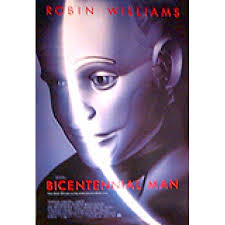
BICENTENNIAL MAN
US, 1999, 125 minutes, Colour.
Robin Williams, Embeth Davidtz, Sam Neill, Oliver Platt, Wendy Crewson, Hallie Kate Eisenberg, Stephen Root, Kirsten Warren.
Directed by Chris Columbus.
Bicentennial Man was released on the eve of the millennium. It is a futuristic film, but looking forward with some kind of optimism. While there were several films about cloning and about robots at the end of the century, like Arnold Schwarzenegger in The Sixth Sense, the beginning of the 21st century brought A.I. in which Steven Spielberg (using material from Stanley Kubrick) explored what it was to be a robot, having a mind, being programmed with feelings but yearning to be fully human. This is also the theme of Bicentennial Man which is based on a short story by Isaac Asimov and from the novel, The Positronic Man by Asimov and Robert Silverberg.
Critics were harsh on the film, mainly because of Robin Williams in the central role. While he plays in one of his more subdued manners, the critics felt that he still over-sentimentalised the character who was more of an outsider in the original material. However, given Robin Williams' style, it is a restrained performance and shows a robot in human form yearning to be fully human, free and recognised as human. The film also makes the point that while robots can live forever, it is important for human beings to live out their term and eventually die as the body decays and their contemporaries also die.
The film also has a lot of reflection about society, its reliance on servants and robots, the manner in which it treats its mechanical appliances who are of service. The film also has much to say about family - which does not seem to improve during the 21st and 22nd centuries in which the film takes place.
Sam Neill brings his usual quiet dignity to the role of the owner of Andrew, the Bicentennial Man. Embeth Davidtz has the difficult task of playing the woman that the robot loves as well as her grandmother who was kind to him and taught him what it was to feel. Oliver Platt is genial as the rough and ready scientist who helps in the transformation of Andrew from machine to human being.
The film might be seen as a variation on the Frankenstein theme - where humanity is able to be creative, especially of positive human values and feelings, rather than of violence.
1. The impact of the film? The influence on science fiction of writers like Isaac Asimov? His perception on the role of science, the creating of machines, robots and androids, their role in society, the effect on society? The importance of life, growing old, death?
2. The span of the film over two hundred years: America of the 21st and 22nd centuries? Similarities to the present, differences? Homes, appliances, the background of the cityscapes? The World Council? The ordinariness of home life, the beach, recreations? Human relationships, strong, disastrous?
3. Robin Williams as the bicentennial man? Half the film with his voice only and the robotic form? His gradually being transformed into the image of Robin Williams? In middle age, growing old? Williams and his comic touches (in telling the jokes)? In more sentimental mode in his service of the family, with Little Miss, with his own quest, travelling the ten years to find robots like him, his transformation, appeal to the World Council, his death?
4. Andrew having a character, the way that he was programmed, mechanical an appliance, repeating words and phrases, learning, reading and absorbing, being creative and sculpting, the clocks? The gradual development as he wanted his own bank account? The discussions with the makers? His wanting his freedom, living by himself? His response to Sir's death? After their clash? The devotion to Little Miss? The clash with her son? His quest, his journey, his return, discovering Portia? Falling in love, finding Rupert, the quest for transformation? His being refused the status of human by the World Council? The passing of the decades, the final speech and acceptance? Dying? His explanation in his speech to the council about what it was to be human, grow old and die? The plausibility of a robot becoming an android, having human experiences? The science and physiology of the spinal cord, the senses? The possibility of eating and drinking, sexual activity? The nature of what it is to be fully human?
5. Sir, his family, buying the robot, his friendship with Andrew? Love for his wife, exasperation at the older daughter, her pushing Andrew out the window, her later behaviour with her bikie boyfriend? Little Miss, her learning, the breaking of the little statue, Andrew and his carving, Sir supporting him? The wedding and Andrew being the usher? Sir and his reminiscing with Andrew, the clash about freedom, the reflections on the nature of freedom, his dying and Andrew coming to him? The portrait of his wife and her support, her feeling Andrew's presence as eerie, getting used to him? Her relationship with her daughters, especially with the biker?
6. Little Miss, a precocious little girl, friendly with Andrew, playing the piano, the transition to her as a young adult, her falling in love with Andrew, his listening but not understanding, her decision to marry? Her growing up, her son and his being a lawyer, taking after his father, her divorce from her husband? Her getting old, Andrew's return, his not recognising her? Her support of him, her death?
7. Portia, the modern young woman, clashing with Andrew, taking after her father? His admiring her work, but his speaking bluntly? Her growing friendship with him, the realisation that she should not be engaged, the engagement party? Supporting him, going to the council? Their growing old together, the final speech, with him in death, turning off the machine? Embeth Davidtz differentiating the two women?
8. Rupert, the memories of his father, his eccentric work, friendship with Andrew, the various experiments, over the decades, transforming him, their friendship, finally making him fully human for human experiences?
9. The technicians at the company, the clashes with Dennis Mansky, the worry about lawsuits, the recall of the robots? Coming back to him decades later and asking for him to transform Andrew?
10. An entertainment, a glimpse into the future, a more optimistic look at the relationship between humans and machines and technological development?
Published in Movie Reviews
Published in
Movie Reviews
Tagged under
Saturday, 18 September 2021 19:29
Bridge, The / 1959
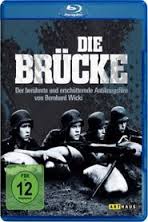
THE BRIDGE
Germany, 1959, 116 minutes, Black and white.
Folker Bohnet, Fritz Wepper, Michael Hinz, Frank Glaubert, Gunther Hoffman.
Directed by Bernhard Wickhi.
The Bridge is one of the most effective and shattering of anti-war films. It takes place over a period of two days only. Schoolboy friends, preoccupied with their own world and their family backgrounds, are called up towards the end of the war, enlist eagerly and within twenty-four hours are at war. What was intended as a holding action on the bridge to the town, becomes a microcosm battlefield of the whole of the war. The slaughter is cruel, painful and meaningless. The Bridge takes some time in establishing the personalities and characters of the boys, their clashes, their adolescent romance, idealism and capacity for being hurt by unwitting parents. Once we know them, we like them and feel with them. Their consequent mad crusade for the fatherland seems all the more terrible and the film has a tremendous impact.
An anti-war must.
1. How would you describe your final impressions of this film; how did it affect your attitudes to the realities of war?
2. Why did the director take his time in leading up to the war sequences? What did he gain by this?
3. How well did you feel you knew the boys before they were called up? Do you think they were a good cross-section of town boys?
4. Which of the boys came across to you as the most interesting personality? Why?
5. What were the boys' relationships to their parents?
6. What was the role of the teacher in the film? Was his role too obvious?
7. How were we continually reminded of the boys' young age - games, clothes, school, "Romeo and Juliet", idealism, shyness, shock at parents' behaviour, etc.?
8. Why were they so eager to enlist? (Are boys like that these days?).
9. Was the sergeant wise in protecting the boys by placing them to guard the bridge?
10. How serious were the boys in their war and defending the bridge - pride of doing their job, idealistic playing of soldiers?
11. How did they react to the battle - killing, horror, death?
12. Did you think the battle scenes effective - the suspense before the American tanks arrived, the old man in the house, the American soldier, the bullets ripping people open?
13. It was an accident that the sergeant was killed and the boys left alone. The action was futile. What comments did the film make on war?
14. How was this story a reflection on the wider issues of war and people's involvement in war, their sense of duty to a cause of which they do not understand the meaning?
15. Was the film completely pessimistic? Why?
Published in Movie Reviews
Published in
Movie Reviews
Tagged under
Saturday, 18 September 2021 19:29
Boys Night Out
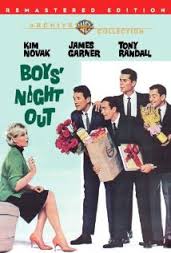
BOYS’ NIGHT OUT
US, 1962, 115 minutes, Colour.
James Garner, Tony Randall, Howard Duff, Patti Page, Janet Blair, Fred Clark, William Bendix, Jessie Royce Landis, Oskar Homolka, Howard Morris, Zsa Zsa Gabor, Jim Backus.
Directed by Michael Gordon.
Boys’ Night Out is an amusing American style comedy about sexual manners and mores. It is very much a film of the early sixties - the wry social comment of American male-female relationships, marriages, the tone that boys take on their night out. It reflects the kind of writing of Paddy Chayevsky in such films as 'Bachelor Party'. It also has overtones of the sociology of sexuality which derives from the Kinsey Report. Another film at this time with more serious tones. was 'The Chapman Report'.
The film is a blend of the serious, the comic the glossy comic soap opera. James Garner and Kim Novak are
at home in this type of role. Direction is by Michael Gordon who has made a wide range of films from Cyrano do Bergerac to a number of Doris Day comedies.
1. How entertaining a comedy? The emphasis on comedy, sex innuendo, social observation on the American male? The light touch, the values?
2. What comedy conventions did the film use? Characters, situations? Ambiguities? Sexual ambiguity? How subtly. How cleverly?
3 The importance of widescreen colour, the atmosphere of New York? The light musical background?
4. How credible was the plot? Is this how this kind of man behaved? How credible a character was Kathy? Her relationship with her doctor? How credible was it to show the four men discussing the accident of being able to rent stich an elaborate apartment? Kathy utilising these men for her research, the role of the wives?
5. How attractive were Kim Novak and James Garner as the hero and heroine for this kind of comedy? How credible a character was Fred? The bachelor, his relationship with his mother and her advice to him about marriage? His relationship with his three friends, work, train commuters, the nature of his fantasy about sex? The humour of his being able to rent the apartment? Ambiguity of his encounter with Kathy? His falling in love with her, the ways in which she tested him? How credible a woman was Kathy? Her arrival at the apartment, her pretending to be the kind of blonde they were after, her research, her discussions with the doctor?
6. How interesting were the characters of the other three men? Drayton and his telling of stories, his relationship with his wife and her finishing his sentences etc? Jackson and his family? The other men and their wives? How typical of American families and their backgrounds? what comment on family life and its quality was the film making?
7. How easily were the audience led into the situation of the boys’ night out? The song and the title and its emphases? How involved did the audience get in wanting them to find a flat? Sharing their crises and their moral risks? The humour of the final boys' night along with the girls night out? How well did the film build up to mini crises? The points being made in these?
8. Were there any memorable sequence or was this merely conventional comedy?
9. The themes of' American masculinity, femininity? The relationship of the sexes? The city and suburbia? Men’s fantasies? Was it appropriate for this kind of film to have a happy conventional ending between Kathy and Fred? Would it have been more pointed to have had an ironic ending? Does this kind of film give insight into the problems and situations it portrays?
Published in Movie Reviews
Published in
Movie Reviews
Tagged under
Saturday, 18 September 2021 19:29
Choke Canyon
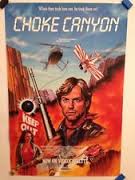
CHOKE CANYON
US, 1986, 95 minutes, Colour.
Stephen Collins, Bo Svenson, Lance Henrickson.
Directed by Chuck Ball.
Choke Canyon is an action thriller which has its very serious tones as well as elaborate action and stunt sequences. Much of the photography in Utah and its canyons is breathtaking, much of it aerial photography.
Stephen Collins is the hero, a scientist interested in safe energy and harnessing sound waves during the coming of Halley's Comet in 1986. However, his canyon is to be used as a dumping ground for toxic waste, pressures from an unscrupulous head of a company, John Pilgrim. The film shows the interaction between the two. There is a good cast including Nicholas Pryor as Pilgrim, Lance Henrickson as his offsider, Bo Svenson as a tough man brought in to oust the hero. The film is obviously on the side of ecology.
1. Interesting drama? Blend with action adventure? Ecology themes?
2. The title, symbolism, Utah, the vistas, the aerial photography, from the ground? Stunts and effects? Explosions? Helicopter and plane flights, loop-the-loops? Combats? The musical score?
3. David Lowell as hero, Stephen Collins' style? Involved in safe energy, his complex, help from Rachel, Halley's Comet and the energy? Energetic, exercise, surveillance? The visitors and ousting them, confrontations with Alistair, the pressures? The destruction of his plant and the destruction of the - jeeps? Horse-riding and leading the people away? The further attacks? His discovery of the truth, going to the party, meeting Vanessa, eating and talking, imprisoning her, her getting out, sharing the adventure, the black ball and the helicopter, the fight on the black ball? The plan for the experiment, success and resolution?
4. Pilgrim and his power, his firm, toxic waste, relying on Alistair, presumptuous, the use of violence, the party, Vanessa kidnapped, his orders? Alistair as the brains behind Pilgrim, doing his orders? Confrontations with Lowell, the demands for the resetting up of his complex?
5. The toughs and thugs? The chief tough man and his pursuit, caught by Lowell? The antagonism between the two? Vanessa's car? The flight of the plane, the black ball and the fight?
6. Vanessa and her protest, relationship with her father, taken, imprisoned, getting out, helping?
7. Rachel and her friendship, background and information, help?
8. Themes of energy, technology, research, money, big business companies and their lack of scruple, toxic waste? Ecological themes?
Published in Movie Reviews
Published in
Movie Reviews
Tagged under
Saturday, 18 September 2021 19:29
Choice, The
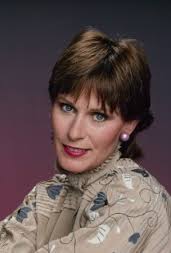
THE CHOICE
US, 1081, 96 minutes, Colour.
Susan Clark, Jennifer Warren, Mitchell Ryan.
Directed by David Greene.
The Choice is a moving telemovie which explores the reality of abortion in contemporary American society. The film focuses on a crisis with a 20-year-old and her facing the choice to have an abortion or not. She confides in her mother who reveals that she has had an abortion in her late 30s. The major part of the film is flashback showing the experience of the mother, the family dilemma, her relationship with her husband, the impact of the anti-abortion groups, the treatment by the pro-abortion clinic, her own personal experience, shared experience of other women undergoing abortion. The film then leaves the question for the audience - with the daughter finally asking her mother would she have an abortion in similar circumstances as her own.
The film is particularly well-acted by Susan Clark as the mother. Jennifer Warren is very good as her friend - who describes the experience of having an illegal abortion in the past. Mitchell Ryan shows the desperation of the middle-aged man not going anywhere in his career. The film was directed by David Greene, director of many telemovies and miniseries including Roots.
Well worth while discussing in family circles, senior school groups.
1. The impact of the telemovie, its focusing on significant social and moral issues?
2. The telemovie style, the similarities to soap operas and television series: characters, situations, emotional treatment, the appeal to understanding and reason?
3. The screenplay and the initial focus on Lisa and Michael, their contemporary situation, the question of abortion? The major part of the film focussing on Kaye and her experience? The ending with the final questions left open? The film's presentation of intellectual and emotional arguments for and against abortion?
4. Younger audiences identifying with Lisa, her initial anxiety, her love for Michael, their living together, his future, job, her anxiety with her friend, her anger at the flute-player, her decision to go home, discussing with her mother, her anger at her father interrogating Michael?
5. The portrait of Kaye as mother, her ability to talk with her daughter, the bond between the two? Lisa thinking she wouldn't understand the pregnancy? Kaye and her memories: her successful work as a mother and bringing up Lisa, her middle age, her friendship with Marsha, her going to work, meeting with the ladies - and their women's talk? The scene of her getting up in the morning and going to work, the contrast with Jerry's reluctance? The growing alienation between the two despite their love for each other? Her symptoms of illness? The visit to the doctor, the revelation of her pregnancy? Jerry's refusal to talk? The discussions with Marsha, the impact of Marsha's story about her own abortion? Her moving towards a decision? The visit to the anti-abortion clinic, the charm of the counsellor, the grim photos, her walking out? Her going to the abortion clinic, the matter-of-fact treatment, the counsellors? Her making the decision - how seriously, the social situation, family situation? Her clarifying her motivations? The visit to Lisa and Lisa's preoccupations with Michael? Unable to talk to Jerry? Her catching him going away? Her feeling alone, reliance on Marsha? Her going to the clinic, the final decision, waiting with the other women but having to go outside? The experience of the abortion and its effect on her? The young girl going to Hawaii with the money from the several putative fathers, the women put in by boyfriends, the woman with the saline treatment and the fear of the child with Downs Syndrome? Her staying to help with the difficult birth? The return home, the reconciliation with Jerry? The revelation for Lisa? Her stating that the heart knows the answer to the dilemma? What is right? How would she have answered Lisa's question?
6. Jerry and his mid-life crisis, a good man, tired, working and interviewing people for loans, the possibility of promotion, his associate and the scale of promotion, his turning against him, the racism within Jerry? The experience of being overlooked, trapped in a job? The attraction towards Tina, going away with her? His anger at Kaye and not listening to her? His speech to the not listening Tina and the audience understanding his anger? His return, standing on his rights about the child, admitting that he was wrong? Talking to Michael - and being more understanding?
7. Marsha as a friend, professional, a model for Kaye, her style, her being anti-housewife? The story of her abortion in Tijuana and its ugliness? Her anger at Jerry, support of Kaye?
8. The world of money, loans, people being upwardly mobile? Middle age and being trapped? Tina and her exploiting of Jerry?
9. The impact of the anti-abortion clinic, the smooth talking counsellor, the use of photos and grim tactics?
10. The abortion clinic, the sympathy, the toughness, the information about the use of tubes? The reality of the clinic and the operations?
11. The counsellors at the abortion clinic, their not working after hours? The women and their various reasons for their abortions? The decision of Kaye to help the woman with the 19-week pregnancy, the saline treatment as the 'heartbreaker'? The visual impact of the abortion? The repercussions on the women physically, psychologically?
12. The procedure and its aftermath?
13. The pros and cons of abortion: how objective was the film, subjective? Facts? Ethical issues, legal issues, moral issues? The audience left to make the decision? The right to this kind of choice?
Published in Movie Reviews
Published in
Movie Reviews
Tagged under
Saturday, 18 September 2021 19:29
Choc, Le
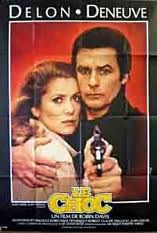
LE CHOC
France, 1982, 95 minutes, Colour.
Alain Delon, Catherine Deneuve, Alexandra Stewart, Philippe Leotard, Stephane Audran.
Directed by Robin Davis.
Le Choc is an exciting French gangster thriller. It stars Alain Delon in the kind of role that he has done very often (Borsalino, The Godson). Catherine Deneuve is as decorative as ever and suggests inner depths for the role of the harassed wife who has to make a choice about her quiet lifestyle or going with the gangster. Philippe Leotard (excellent in La Balance) has a strong role as Catherine Deneuve's husband. There are guest performances by Alexandra Stewart and Stephane Audran. Delon and the director, Robin Davis, helped with co-scripting the film.
It is a film of the '80s: violent, colourful, fast-moving, action packed, seemingly amoral. Audience sympathies are invited for people who inhabit the shady world of violence and hired killers.
1. The quality of this gangster thriller, French style? Entertaining, action, pace? Cinema flair?
2. The title and the references to shocks for the various characters? The dramatic presentation of shocks?
3. French settings, the opening in Africa? Contemporary, apartments, banks, streets? The contrast with Brittany and the turkey farms, the coast? The film as an urban thriller, the use of the city? Stylish photography? The score and its range of styles and themes including mediaeval ballad music?
4. The stars, audience expectations of them, their style?
5. Martin (Christian): Africa, his gun, the cool assassination from the carriage? His return to Paris? The encounter with Michel and his treating him strongly? The relationship with Mathilde, his expectations of her, the breaking of the affair, his emotional brutality? His love for his cat - by contrast? A hard unmoved man? His decision to opt out of his profession? The visit to Cox and the clash with his henchmen, the fork in his hand? His being followed in the Metro and his confronting the pursuer? The criminal in his apartment, his getting the cat from Mathilde, the criminal holding Mathilde as hostage, the disturbance by the cat. his quick action in killing him? His decision to leave Paris? His getting his money from the bank, the relationship with Jeanne. friendship, her advice about turkey farms? The turkey farm and the encounter with Claire? His awkwardness on the farm? Attraction to Claire? The possibility of surviving in the country? Did he elicit audience sympathy?
6. His life on the farm, the turkeys, the meeting with Claire, the clash, Felix returning home from the convention, the drinking, the abuse of his wife at the meal table? Claire and her defiance? Her succumbing to Martin? The liaison. the walk along the beach? Tension mounting within the group? Martin unable to tell her the whole truth during the meal?
7. The suddenness of the terrorists and their attack, the killing of Felix. Claire's action to save Martin. Martin's initiative and his killing of the terrorists? Flight, taking the car, offering the choice to Claire, her taking it? Paris. the cover at the hotel. his money gone from the safe, Jeanne's death, in crisis?
8. Cox and the confrontation? The offer of the new job? The liaison with the police security officer? The assassination set-up at the Arc de Triomphe? His not assassinating the victim? The confrontation with the policeman? His shooting him?
9. Martin's final confrontation with Cox: going with Michel, the deaths of the henchmen, Cox and his defiance and bluff, Michel being shot, the resolution in the parking area, Michel's jealousy and telling the truth of his trying to destroy Martin? Michel's death and its melodrama? Martin's escape with Claire in the helicopter?
10. Martin as a character, ruthless, professional (the scenes of him assembling the gun blindfold), Relationship with women, the cat, the quality of anticipation of pursuit. his emotional responses. falling in love with Claire, letting her share his life, his future?
11. Claire and her work on the turkey farm. her hopes. marriage to Felix, the bitterness of the marriage, her being humiliated by Felix. succumbing to Martin. the walks along the beach? Her choices - and her going with martin? Felix and his brutality - a good character sketch of an abusive self-pitying husband?
12. Jeanne as eccentric, her animals, the cats, the bank, her advice on investment? The pathos of her death? The irony that she was Martin's wife - their separation, their continued friendship?
13. Cox and his power, ordering assassinations, links with international groups, terrorists? His henchmen and their brutality? Martin's spurning Cox's main henchmen, the pool, his death?
14. Michel and his weakness, coming to Martin's flat., the underlying jealousy, helping his friend at the end yet the revelation of his betrayal?
15. The amoral world of assassins and professional criminals? Audience interest in this kind of world, character?
Published in Movie Reviews
Published in
Movie Reviews
Tagged under
Saturday, 18 September 2021 19:29
Chitty Chitty Bang Bang
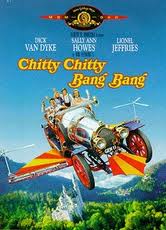
CHITTY CHITTY BANG BANG
UK, 1968, 145 Minutes, Colour.
Dick van Dyke, Sally Ann Howes, Lionel Jeffries, Gert Frobe, Anna Quayle, Benny Hill, James Robertson Justice, Robert Helpmann.
Directed by Ken Hughes.
Adults enjoy films designed especially for children if they see them in a theatre full of children. The obvious over-acting, the repetition, the unsubtle psychology, the predictable episodes, the age-old horse play are aimed at the children who love it. After Mary Poppins and Doctor Doolittle which can only be appreciated when seen with children, comes the greatest car on land, sea or air, Chitty- Chitty Bang- Bang. Inventions (a machine to cook and serve bacon and eggs while you sit and wait), magic, castles, an eccentric grandfather who goes into his hut which can be Africa, Alaska or where he wants, a battle where children overcome the Baron's court, a yarn by Ian Fleming, wonderful use of the serial technique for intermission - they're all there. One of the better films for children.
1. Was this an enjoyable film? For what ages? For adult enjoyment? Why would children delight in it?
2. Was it an enjoyable comedy? Funny? What were the best characteristics of its comedy?
3. How good an adventure was it? A fantasy adventure, but with conflicts and danger? Heroism and happy ending?
4. Was it attractive because it was about a family? Was the family attractive? Why? Could children identify with it?
5. How important was the car in the film? How do cars, especially vintage cars, appeal to modern audiences? Did the film use this well?
6. Comment on the British setting, British manners, Edwardian atmosphere, and transferring from an Edwardian atmosphere to a European fantasy land. How did this give an atmosphere to the film?
7. why was Caractacus Potts so attractive? The personality of Dick van Dyke? As a father? As an inventor? As poor? Did you like Grandfather? Why was he so eccentric? What characteristics of the British was he satirising? His going on his expeditions? His love for the grandchildren? How attractive were the children?
8. Was Truly Scrumptious an attractive heroine? The importance of her encounters with the family? Her having a car? The bond that the car made? The fact that her father owned a sweets factory? The attraction for a children's audience of the sweets and the factory? Did you like Truly's father? Why?
9. How important were the songs in the film? The title song itself and the atmosphere of the car? The Husha Bye and Lullaby songs? The songs between Caractacus and Truly? The toot sweet song at the factory? Would the film have been different without the songs? Better without the songs? Why?
10. How did Chitty Chitty Bang Bang become a character in the film? What kind of personality did the car have? The sequences where it was being built by Caractacus and the anticipation of the children? Truly's joining them and Chitty Chitty Bang Bang in going for the picnic etc.? The fact then that the car entered into the fantasy story and flew through the air, etc.? How important was this for engrossing the audience?
11. How skilfully done was the introduction of the fantasy story? The transition from the picnic and the enjoyment to the story element with the King of Vulgaria arriving by ship etc.? Comment on the dramatic value of the intermission with the car going over the cliff? How important and exciting was this?
12. What was your opinion of the King of Vulgaria? The fact that he wanted to steal the car? That he was jealous of flight? His vices and pampering of himself? His pampering of the queen?
13. What was your reaction to the Kingdom of Vulgaria? That it looked so beautiful? The castle and the scenery? Yet the people within it? The king as a big child? The queen as a kind of a witch? The fact that there were no children? That toys were banned? How would children respond to this situation? (In contrast with an adult's view?)
14. What were your impressions of the people in Vulgaria? The horror of the child-catcher and his abducting the children? His hatred of children? The toymaker and his attraction for the children? His help towards Caractacus and Truly?
15. The party sequence: how extravagant? How delightful for a children's audience? The use of colour and the use of the decor for this sequence? The contrast with the children underground? The importance of the fight in this setting? The reaction of the king and the queen with the child-catcher? Truly as a doll and the coming alive of the dolls? was this an important clash and conflict for the film?
16. Were you glad when all was happy at the ending? What had they all learnt by the story that Caractacus told? Was it a satisfying, happy ending with prospects for the future? Was this a good children's film? Or not?
Published in Movie Reviews
Published in
Movie Reviews
Tagged under
Saturday, 18 September 2021 19:29
Chisum
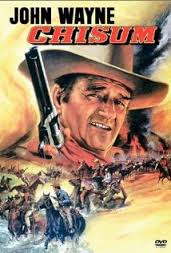
CHISUM
US, 1970, 111 minutes, Colour.
John Wayne, Forrest Tucker, Christopher George, Bruce Cabot, Glenn Corbett, Alan Duell. Andrew Prine. Patric Knowles.
Directed by Andrew V. Mc Laglan.
Chisum was the film John Wayne made immediately after his Oscar winning performance in True Grit. He returns to the range as John Chisum, the big landowner involved in the cross-fire between Pat Garrett and Billy the Kid. Treatment is big and sprawling, so typical of director Andrew V. McLaglan's Wayne Westerns, like McLintock?, The Undefeated, Cahill, All Western themes.
1. Was this a typical John Wayne Western? (What constitutes a typical John Wayne Western?)
2. How heroic and ideal was John Chisum himself meant to be? Note the opening and closing scenes with the profile of Chisum on his horse as he surveys his 'kingdom'.
3. Why was Chisum a 'big' man - stature, his owning of so much land, strength of character, influence, standards, principles of right and wrong?
4. What was Chisum's sense of justice based on? How did he judge right from wrong? How did he right wrongs?
5. The other characters made sense in relation to Chisum. Consider each one in turn:- the girl and her independence, admiration for him. her falling in love; Pat Garrett. a younger version of Chisum; Billy the Kid, full of potential, but liked killing for its own sake rather than justice, had the smell of death around him (he contrasts with Pat Garrett); Sheriff Brady, a tool of the moneyed man; Murphy, his influence, greed, a contrast with the ideals of Chisum, allowing so much bloodshed, hiring killers; the hired killer, ruthless, with no feelings or scruples; the young lawyer (and his wife), idealistic, transferring loyalty to Chisum, dying for it; Tunstall, his old traditions and sense of honour, loyal to Chisum.
6. Was a shoot-out and siege the only way to achieve justice and peace in the West?
7. What code did these men believe in?
8. This violent West is the heritage of the U.S. How has it influenced the Americans' belief in himself, his traditions, his attitudes to justice, stepping in to set things right, to violence?
Published in Movie Reviews
Published in
Movie Reviews
Tagged under
Saturday, 18 September 2021 19:29
Chinese Roulette
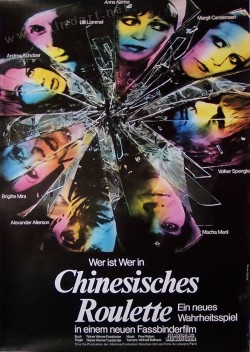
CHINESE ROULETTE
West Germany, 1976, 82 minutes, Colour.
Margit Carstensen, Ulli Lommel, Anna Karina, Brigitte Mira.
Directed by Rainer Werner Fassbinder.
Chinese Roulette is one of the many films from the prolific German writer-director Rainer Werner Fassbinder. Many of Fassbinder's films are formal studies of relationships, presented quite artificially and formally. Others echo his admiration for many of the Hollywood melodramas and soap operas. The structure of Chinese Roulette resembles his exercises in formal film-making while the presentation of characters and events is in the style of the Hollywood homage and realism. It makes for a strange mixture - provocative, questioning. Fassbinder uses many of his regular troupe of actors and actresses but has engaged the services of French actress Anna Karina, long associated with the work of Jean- Luc Goddard.
As with so many of Fassbinder's films, it can be seen as a critique of German lifestyle, the affluent post-war lifestyle of Germany. Fassbinder often indicates that self-centredness, emotional neuroses and violence are the heritage of the experience of the defeat and the post-war economic miracle.
1. The work of Fassbinder: his formal studies, the homage to Hollywood melodramas? The influences in this film? The blend of the stylised and the realistic?
2. The importance of the ensemble work of the cast? The screenplay written to highlight individual characters - and then put them into complex interreactions with one another?
3. The focus of the title: a puzzle, a game? A deadly game - the possibility of violence and death? The title dramatised as a deadly game?
4. Fassbinder's perception of Germany in the '70s? German society, affluence, lifestyle, manners and morals? Sympathy? Critique? Fassbinder both presenting and judging German society?
5. The opening formality of the film: the mother and daughter listening to music? The moving to the wider world of husband and wife? The world of adults? Betrayal and childish behaviour, lies? The focus on the crippled child and her nurse? Her will, control, havoc? The encounter of the pairs and a type of musical chairs? The atmosphere of meals. good-fellowship? Games - real, leading to reaction and violence? Whose violence? To whom? The facts of what happened to each character? The psychological violence? The mysterious ending and shot? The use of the roulette image - was this game determined or a gamble?
6. The central character of the daughter? with her mother, listening to music, her disability? The symbolism of the lame girl? Innocence, malevolence? Relationship with her nurse and companion - ultimately her being shot? The phone call. the daughter able to handle her mother and father? Her willpower? The way that she was placed in sequences. poses and postures? Her involvement in the adult game.. provocation? Growing malevolence? The writer and her taunts of him, saying his writing was not original? His ability to see through her - and that she intended violence to her mother?
7. The sketch of the parents? The echoes of television movies and series? Brittle, wealthy, busy, jet-setting, travels to Norway and Italy? Plans? Lies? The satire and comedy in each going to the castle with a lover? The detailed deception, the travel, the mod? The revelation when they met? The helpless laughter? The decision to cope - the meeting even freeing them? Manners and morals? Their regard for their lovers? To the others in the house? Settling in for a weekend, the reading at meals, the reliance on the housekeeper? The move to games, the violence of truth games? Ability and inability to cope? Husband and wife being thrown back on each other and uniting? Their daughter? The violence - to whom? At whom?
8. The lovers portrayed in themselves? As complementary to their partners? Contrasts, parallels? Their being used? Willingly going to the castle? Their embarrassment? Behaviour, coping - and caught up with the violent game?
9. The housekeeper and her discreet management, control. participation in the lies of both parties. her care for the group, her regard for her son?
10. The son and his work around the house, the androgynous type, the visit to the garage? His writing and its philosophical overtones -intelligible or not? His reading at meals? His becoming involved. the daughter exposing his writing, his exposing her, reading her thoroughly?
11. The final shot and its ambiguity? What was the audience left with?
12. The amount of talk, quality of the ideas, observation of relationships - in a German literary and cinema context? A portrayal and critique of human nature and of Germany?
Published in Movie Reviews
Published in
Movie Reviews
Tagged under
Saturday, 18 September 2021 19:29
Chinatown
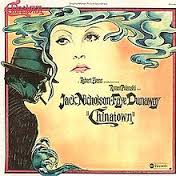
CHINATOWN
US, 1974, 125 minutes, Colour.
Jack Nicholson, Faye Dunaway, John Huston, Perry Lopez, John Hillerman.
Directed by Roman Polanski.
Chinatown is an excellent film nominated for many awards and the receiver of critical acclaim. The gangster private-eye genre is one of the most characteristic of the American film of the 30s and 40s, films which were grim, tough, in stark black and white.
The sixties saw the private eyes as seedy and disillusioned, often taken in by the villains. Paul Newman's Harper is a good example of this. Then there was the trend of Steve McQueen's Bullitt. In the seventies Roman Polanski, famous for his Rosemary's Baby, Macbeth etc., enlivened the genre with widescreen and colour, but uses the styles, fashions and locations of the early films to offer a classic of its kind. The complicated plot holds the attention.
Jack Nicholson at his peak combines the styles of the 30s and the 70s well. Faye Dunaway, nominated for an Oscar, is aloof and moving. John Huston leads an excellent supporting cast as a crooked millionaire. Polanski himself makes a memorable, if momentary appearance. In all its facets, Chinatown is excellent.
Jack Nicholson was to direct a sequel fifteen years later, The Two Jakes.
1. The tone and meaning of the tittle? Chinatown as a symbol for Jake Gittes? As a reality at the end of the film? Summing up Gittes' career? Chinatown as motif of meaning in the film?
2. How well did the film create the private-eye genre atmosphere? In comparison with originals? In terms of screenplay, dialogue, situations, personalities, locations? The parallel with private-eye films of the 30s and 40s? Styles, acting? The use of music, fashions etc.? Yet the modern overtones with the hero loser atmosphere?
3. Comment on the issues on persons being used, the private eye; Gittes, response to this particular world and people using him? The atmosphere of being used?
4. Comment on the skill and intricacy of the plot? How well thought out was it, its strands interconnected? How did it hold audience attention?
5. The film's presentation of the theme of life and death, murders, callous attitudes towards life? The preciousness of life?
6. The theme of wealth - Cross and his ambitions, his not being poor, his seeking of power, means for wealth? Evelyn Mulwray's wealth? Money for Gittes? The poorer people in the story?
7. The film's picture of society? American society? Los Angeles, the city itself, its administration, the water department, the police, officialdom? The hold that millionaires and crooked politicians have on society?
8. The atmosphere of drought in the city, water and life, corruption and death, drownings in water, the use of water as a symbol for the themes of corruption?
9. The theme of poverty - the Orange Grove owners, the buying up of land, the old people whose names were used, Chinese in Chinatown, Curley and his case?
10. The film's presentation of relationships and mystery? Evelyn herself, Hollis and Catherine, the relationship between Evelyn and Hollis? Catherine in herself, Noah Cross' relation to them all? The consequences of relationships?
11. How effective was the telling of the story about Chinatown by Gittes to Evelyn? Its not being finished because of the phone call? The culmination in Chinatown and the ending of the film?
12. How well portrayed was J.J. Gittes? Jack Nicholson's performance? Style, his dialogue, smartness, the nature of his past, police work, the initial work for Curley, his being taken in by the false Mrs. Mulwray, the consequences of his work, the exposition of Hollis Mulwray by the papers, the scene in the barbers, his reaction to the truth? His going for the truth, relationship with Evelyn and its growth, his challenging of Cross, his wanting to help but being too late, his capacity for being disillusioned? What kind of a person was he? What kind of a person must a private-eye be?
13. Comment on the detail of portrayal of his work - his office, relationships with his fellows, the following of Mulwray, the dams, the sea, the Albacore club, going to the home, questions about the Jews etc., taking the page from the archives, the Orange Grove, to see the dead woman, his relationship with the police. his help with Curley at the end.
14. How well portrayed was Evelyn Mulwray? Her haughtiness, her style. place in society, relationship with Mulwray. the fact that she protected her daughter, the truth and its ugliness and repercussions on her? Her capacity for love. the escape. her being brutalised by Gittes? Chinatown as the last chance, the tragedy of her death? The significance and style of Faye Dunaway's performance?
15. The portrayal of N6ah Cross - the past, the photos on the wall, the reality of his power, relationship with Mulwray, his style at the club and power over Gittes, his deals. the murder, the using of thugs, wanting Catherine, the sexual overtones of his power? The finale and his shielding of Catherine, the irony of his evil causing so much havoc?
16. Comment on the portrayal of Hollis Mulwray - his speeches, his visits to the dam, and the water outlets, the seeing of his murdered body, and then the truth?
17. The portrayal of officials such as Yelbertson, Gittes' reaction to him, intimidation of him?
18. The portrayal of thugs like Claude, and the violence of the slitting of Gittes' nose?
19. How violent was the film - was it appropriate? Especially the scene of the slitting of the nose? The murders? The brutalising of Evelyn, the ending and the shooting?
20. How tragic was the film - instead of merely being full of pathos? The role of sorrow. fate?
21. How humorous was the film? Gittes' details of behaviour and reaction to people? His quips? His sorrow and humour as part of humanity of the film?
22. Comment on the wealth of detail in the film. The highlights? The culmination of the whole film in Chinatown?
23. Comment on the excellence of the screenplay and the direction and how this was communicated.
24. Why will this film be considered a classic?
Published in Movie Reviews
Published in
Movie Reviews
Tagged under